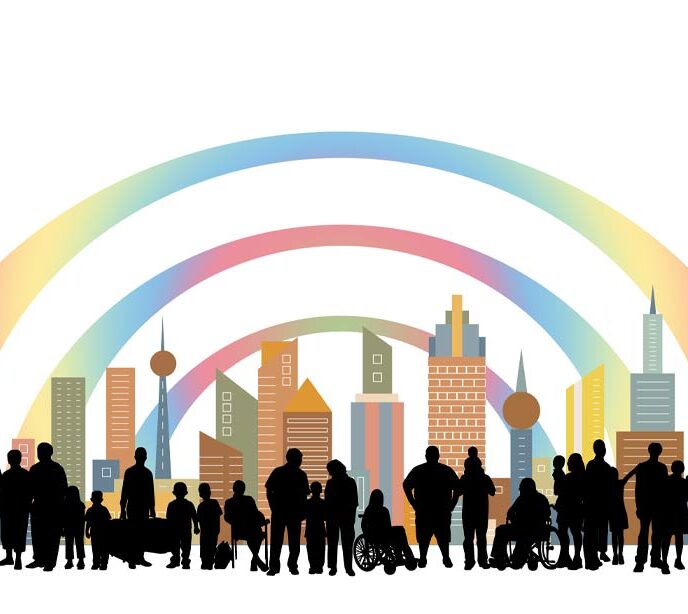Autism & Sibling Stress
Do Siblings of Autistic Children Suffer Increased Stress?
Every day, being a parent brings a new lesson about love, patience, and resilience and when you’re raising an autistic child, you’re exposed to even more unique joys and challenges. If you have more than one child, you have probably noticed the extraordinary bond that forms between your children – a bond shaped by understanding and adaptation. However, this bond can also come with its fair share of hurdles, some of which can go unnoticed by families, especially for the sibling of an autistic child.

The bond between allistic (non-autistic) and autistic siblings is shaped by a number of factors, from their individual personalities to the family environment and the nature of their experiences together. And, while these sibling relationships are largely rooted in deep empathy, understanding, and support, they can also result in feelings of jealousy, guilt, or even resentment, usually due to the amount of attention an autistic child receives both at home and in social situations.
So, how can parents help their allistic children cope when they may feel overlooked, overwhelmed, or unsure of their place in the complex family dynamic? This blog explores the main challenges experienced by siblings of autistic children and how parents can support and nurture their entire family to ensure that their children grow into compassionate, balanced individuals.
Autism and Siblings: What The Research Says
While sibling relationships are different in every family, growing up with an autistic sibling has its own unique challenges. According to a research paper on siblings of autistic children (The Quality of Life Among Siblings of Autistic Individuals: A Scoping Review), “non-autistic siblings of autistic individuals experienced decreased psychological well-being, less perceived social support, increased aggressiveness and conflict-proneness, and higher levels of anxiety and stress impacting their quality of life.”
By understanding and addressing sibling stress, providing support, fostering open communication, and promoting self-care, we can create an environment that supports the well-being of all family members.
Together, we can ensure that children not only cope but also thrive in their relationships with their autistic siblings, fostering a stronger and more inclusive family bond. Let’s delve into the main challenges faced by allistic siblings and explore some tips on how to help them cope with their autistic brothers and sisters.
The Main Challenges of Having an Autistic Sibling
It is difficult to single out generic issues that affect families with an autistic child or children. It is especially complex when trying to understand the effects of autism on siblings, given that all families are different and all children within those families are different.
For example, a younger sibling has always lived with autism in the family but may struggle to establish their own identity within the family dynamic, while an older sibling may resent the loss of attention to the autistic sibling who came later. Combined with the personalities and temperaments of each child, and even the nature of the autistic sibling, dynamics can vary considerably. However, it is important to be aware of the issues that can arise from the specific dynamic between allistic children and their autistic siblings.
Here are some common issues that have been highlighted on how autism affects siblings.
Family Dynamics
How a family responds to having an autistic child has a significant impact on allistic siblings. In some cases, when parents or guardians of an autistic child blame each other for the challenges it brings, it can lead to a separation or divorce.
One guardian may end up with custody of both children and feel overwhelmed, angry, and frustrated. When the demands of autism become too much, this guardian might walk away or react with anger. As a result, the allistic child grows up in a chaotic environment, learning that challenges can strain family dynamics. This is one of the many reasons that it is so important to learn how to manage your stress as the parent of an autistic child.
At a more practical level, the daily routines and dynamics of the family can be significantly impacted by the needs and demands of an autistic child. Siblings may have to adapt to changes in schedules, limited family outings, or altered family dynamics, which can create stress and a sense of imbalance.
Embarrassment
Embarrassment is a tough challenge for siblings of autistic people, especially during childhood or adolescence. Children and teenagers often place a high value on the opinions of their peers, and when an autistic sibling displays behaviors that are perceived as “different,” such as stimming, sensory sensitivities, or trouble navigating societal norms, allistic children can start to worry about how their peers will react. Children can be judgmental and may make hurtful comments about their autistic siblings, which can amplify these feelings and leave them feeling conflicted between loyalty and love for their autistic brother or sister and their own desire for social acceptance. In response, they need to develop skills to support their autistic sibling and confront ableist bias as they grow older.
Emotional Impact
Having an autistic sibling means the whole family has to make adjustments. Allistic siblings may experience a range of emotions, including confusion, frustration, embarrassment, or even guilt. They may feel a sense of responsibility or worry for their sibling’s well-being, especially in social situations or when witnessing their struggles. It’s really important to take care of the mental health of the children who aren’t autistic so they don’t develop feelings of resentment towards their autistic siblings.
Often, they have to give in and make compromises. They may have to watch the same movie over and over again, leave a fun event earlier than they’d like, or even say “no” to throwing a big party, just to make sure their autistic sibling is comfortable. And as they get older, these siblings might realize that their parents have less time and money to help out with things like college, weddings, or buying a home.
Great Expectations
Autistic siblings often require additional attention, support, and resources. This can lead to siblings feeling overlooked or neglected, as parental focus may be primarily directed toward meeting the needs of the autistic child.
Even at a young age, siblings of autistic children are often expected to navigate their own emotions, take on additional household responsibilities, and put their own desires on hold. Independence at an early age is not uncommon, and comes with benefits, but also has its pitfalls.
As they grow up, these siblings may find themselves shouldering even more responsibility for their autistic sibling, especially when it becomes challenging for their parents or guardians to manage everything. It’s a journey that requires understanding, compassion, and a willingness to lend a helping hand within the family unit.
Communication and Relationship Differences
Siblings may find it challenging to establish typical sibling relationships due to differences in communication styles, social interactions, and play patterns. They may struggle to connect with their autistic sibling on a deeper level or face difficulties engaging in shared activities. Conversely, siblings may develop more of a parent/child relationship with their autistic sibling, which brings a different dynamic and feeling of increased responsibility at a young age.
Financial Pressures
Money can play a significant role in the lives of families raising an autistic child. While it’s possible to navigate autism with limited financial resources, it can be incredibly challenging. Accessing resources, researching therapies, and attending appointments become harder for parents with hourly jobs or without internet access.
And when those limited financial resources are primarily allocated to services for an autistic child, there may be little left for the needs of other children. College funds might be redirected to autism therapy, and additional expenses like fitting schools or respite care may require sacrifices. This can lead to resentment from allistic siblings towards both their guardians and their autistic sibling.
Overwhelmed parents or guardians may lack the energy to assist with homework, coaching, transportation, or other typical caregiving activities. They may be unaware of school issues, emotional challenges, or potentially risky behaviors.
The Strengths of Allistic and Autistic Sibling Relationships
There is no denying the challenges that come from the unique dynamics between autistic and allistic siblings, but that doesn’t mean that the relationship is always difficult. These sibling relationships often come hand-in-hand with unique strengths and beautiful, life-enriching experiences that shape who they are as people. From fostering empathy to developing advocacy skills, these connections can become a source of mutual growth and profound understanding.
- Empathy and compassion: Allistic siblings often develop a heightened sense of empathy and understanding. Growing up with an autistic sibling gives them insight into different ways of thinking and being, nurturing a deep appreciation for diversity and the importance of kindness.
- Loyalty and unbreakable bonds: The shared experience of navigating the challenges and celebrating the victories of an autism diagnosis can forge a uniquely strong relationship between allistic and autistic siblings.
- Advocacy skills: From an early age, allistic siblings often learn to advocate for their autistic brother or sister, especially in social or educational settings. This skill not only benefits their sibling but also prepares them to stand up for others and champion inclusivity in broader contexts.
- Teamwork and problem-solving: Navigating the dynamics of an autistic-allistic sibling relationship encourages creative problem-solving and teamwork. Finding ways to connect, communicate, and compromise strengthens their ability to work collaboratively in other areas of life.
- Celebration of uniqueness: In families where differences are embraced, siblings have the opportunity to celebrate and honor each other’s individuality. This strengthens the entire family dynamic and creates a foundation of acceptance and inclusivity.
Focusing on these strengths doesn’t negate the challenges, but it highlights the potential for profound connection and personal growth in allistic and autistic sibling relationships. The key is building on these strengths to create a nurturing environment where both siblings can thrive. By emphasizing open communication, shared activities that are safe for autistic children, and strong family support, we can ensure that these relationships blossom into a lifelong bond that celebrates the individuality of both siblings.
How to Help Children With Autistic Siblings Cope
While there is no one way to deal with the dynamics between siblings, there are a few tips on how to help your allistic child deal with their autistic siblings.
Education and Communication
Providing children with age-appropriate information about autism can help them understand their brother or sister better. Open and honest communication within the family can foster empathy, reduce confusion, and promote understanding.
Children may have misconceptions, such as thinking autism is contagious or caused by their own behavior. Discussing how autism affects their siblings specifically, helps children see them as a whole person with strengths and challenges.
The first step to helping siblings understand autism is to start talking about autism when they begin to understand or notice differences. Adapt the conversation based on their age and understanding. Ask what they already know, use age-appropriate language, and be prepared to explain multiple times. Open communication fosters understanding and empathy among siblings, creating a supportive family environment.
Individual Attention
Setting aside dedicated time for each child is crucial. It communicates that their feelings and experiences are valued and boosts their confidence and sense of belonging within the family.
When allistic children have a positive self-perception, it can enhance their relationship with their autistic siblings.
Create special moments by dedicating regular time each day to activities like bedtime stories or sharing positive moments. Additionally, listen attentively to your children’s thoughts and make time for enjoyable outings. Consider arranging trusted caregivers to look after the autistic child, allowing you to spend more quality time with their allistic siblings.
Foster Positive Interactions
Siblings of autistic children often have positive feelings towards their brothers or sisters, but their relationships may not always be as close due to challenges in social communication.
Encourage siblings to engage in activities that promote bonding and positive interactions. Finding common interests or creating structured activities that allow siblings to connect and have fun together can strengthen their relationship.
For instance, engaging in shared interests like playing with trains or participating in basketball can create opportunities for inclusive play and enjoyable interactions among siblings. Finding common ground and promoting inclusive activities can strengthen sibling relationships and create lasting memories.
Seek Professional Support
Consider involving therapists or counselors who specialize in supporting families with autistic children. They can provide guidance, strategies, and emotional support to both parents and siblings.
There are also various organizations available to provide support for siblings of autistic children, such as Siblings of Autism, the Sibling Support Project, and Sibs Journey.
These organizations offer valuable resources and assistance. Additionally, it is beneficial to explore the local resources available in your area, such as autistic sibling support groups, respite care services, and specialized programs specifically designed to support allistic siblings.
Mental Well-Being and Self-Care for Siblings
It is essential to prioritize the well-being of siblings. Encourage them to engage in self-care activities, such as hobbies, sports, or spending time with friends, to help alleviate stress and promote their overall mental and emotional well-being.
It’s also important to be attentive to your allistic children’s feelings and validate them. When your child expresses frustration, acknowledge their emotions. Often siblings feel guilty communicating their frustrations with their autistic siblings, especially to their parents, because they know you are also overwhelmed. Engage in open conversations with your children about their feelings in a non-judgmental manner.
Collaborate with your children to find positive ways to channel their emotions, such as drawing or painting. By sharing your own feelings, you help your allistic children realize that their emotions are normal.
Manage the Children Fairly
Ensuring fairness among your children is crucial, and establishing clear family rules can help achieve this. Strive to create family rules that are fair and consistent for all your children whenever possible and implement strategies that encourage positive behavior in all your children.
Avoid accepting aggressive or hurtful behavior from your autistic child if you wouldn’t tolerate it from your other children. Encourage all of your children to contribute to family life; sharing responsibilities within the home fosters unity and imparts essential independence skills. Tailor tasks and chores to accommodate your children’s diverse ages and strengths.
Grow Together With Lighthouse Autism Center
Among the many autism resources available at Lighthouse Autism Center is a large community of families who deal with the dynamics and challenges laid out in this blog. Join them in their pursuit of fostering better sibling relationships through treatments like LAC’s innovative Lighthouse Fusion ABA Therapy to help their autistic children better navigate family life.
Together, we can unlock your child’s potential
Related News

06/11/2025
Overcoming Stereotypes
Autism stereotypes are common and can have significant social consequences for autistic children. Misconceptions hinder the acceptance and inclusion of autistic children. Challenging these stereotypes is vital for creating a more understanding and supportive society. Challenging Common Autism Stereotypes When people hear the word “autism,” they often imagine a narrow set of images, like the […]

06/11/2025
What’s Next After ABA Therapy?
There are a number of reasons why an autistic child might stop ABA therapy, and one is that they have reached their goals. In this article, we take a look at what parents can expect going forward. What Are the Next Steps After ABA Therapy? As a parent, you only want what’s best for your […]

06/11/2025
Do Babies with Autism Smile?
We take a look at the importance of early intervention, some of the milestones for parents to look out for, and the more common signs of autism in babies. Do Babies with Autism Smile? Watching your baby grow is an exciting time, certainly one of life’s quiet wonders. From those first sleepy stretches to the […]


